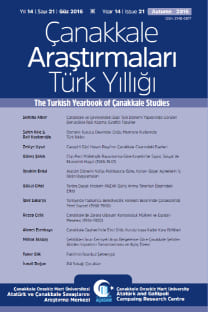Dark Humor in the Trenches of Gelibolu
Gelibolu battlefield, Anzac soldiers’ diaries, dark humor, theory of humor
___
Works Cited: Alcock, Private H.T.C., File No. 12/11/235. Australian War Memorial, Canberra 1915. Aristotle, Poetics, Trans. S.H. Butcher, Hill and Wang, New York 1961. Bakhtin, Mikhail. Rabelais and His World, MIT Press, Cambridge 1968. Bergson, Henri, Laughter: An Essay on the Meaning of the Comic. Trans. Cloudesley Brereton. New York: 1911, Macmillan. Brown, Katherine and Elina Penttinen, “A ‘Sucking Chest Wound’ is Nature’s Way of Telling You to Slow Down: Humor and Laughter in War Time”, Critical Studies on Security, vol. 1.1, June 2013, pp. 124-126. Chandler, Adam, “Remembering Umberto Eco”, The Atlantic, Feb 19 2016. Dodd, Arthur William. MSS:0818. File No: 419/27/12. Australian War Memorial, Canberra. Eco, Umberto, “The Art of Fiction No 197”, Interview by Lila Azam Zanganeh, The Paris Review, no. 185, Summer 2008, p. 124. Frye, Northrop, Anatomy of Criticism, Oxford University Press, Princeton and Oxford 1971. Haworth, Paul, PR0156, Papers of Corporal Paul Haworth, Australian War Memorial, Canberra. Hobbes, Thomas, Leviathan or, the Matter, Forme and Power of a Common-Wealth, Ecclesiasticall and Civil, Barnes and Noble, New York 2004. Üngör, Uğur Ümit, “Funny as Hell: The Functions of Humor During and after Genocide”. European Journal of Humor Research, no 3.2.3, pp. 80-101. Kemaloğlu, Azer Banu, “Düşmanlıktan Kalıcı Dostluğa: Türk ve Anzak Askerlerinin Günlüklerinden Kültürel Yansımalar,” Çanakkale Araştırmaları Türk Yıllığı, V. 15, Çanakkale Güz 2013, pp. 145-47. --“From Hostility to Lasting Friendship: A Study of the Anzac and Turkish Soldier’s Personal Narratives”, In Çelikel, M. A. & Taniyan, B. (ed.) English Studies: New Perspectives, Cambridge Scholars Publishing, Newcastle Upon Tyne 2015, pp. 23-35. Kitson, Henry, MS4540. Wellington National Library, New Zealand 1915. Lott, Leslie, MSS1122, Australian War Memorial, Canberra 1915. McLarty, L.T. H.R, 3DRL3339. Australian War Memorial, Canberra 1915. Plato, Philebus, (Trans. J.C.B. Gosling), Clarendon Press, Oxford 1975. Prior, Robin, Gallipoli: The End of the Myth, Yale University Press, New Haven and London 2009. Saunders, Charles W., MS7336-1 Wellington National Library, New Zealand 1915. Tennyson, Alfred. “Charge of the Light Brigade,” Tennyson a Selected Edition, Christopher Ricks (Ed.), Routledge, New York 2007.- ISSN: 2148-0877
- Yayın Aralığı: 2
- Başlangıç: 2003
- Yayıncı: Murat Karataş
The People’s Houses as a Model of Non-Formal Education in Turkey (1932-1951)
Sultan Abdülmecid Döneminde (1839-1861) Tuna-Karadeniz Arasında Kanal Açma Teşebbüsü
Destinasyon Pazarlaması ve Transmedya: “The Water Diviner” Üzerine Bir Değerlendirme
Refik Halit Karay’ın Eserlerinde I. Dünya Savaşı, Anadolu’da Sosyal Hayat Ve Göç
Özbek Şair Mahmut Hâdi (Batu) ve Eserleri Hakkında
Gaius Sallustius Crispus’un De Coniuratione Catilinae’da Beliren Tarihçi Kişiliği
Remembering Rupert Brooke and Siegfried Sassoon in Gelibolu Novels
Afshar Nader Shah: Military Leadership, Strategy and the Armed Forces During his Reign
